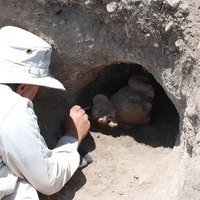Papers by Samar Kanafani
Lahoucine Ouzgane, Islamic Masculinities
On Deference and Benevolence

On Deference and Benevolence: The Politics of Parking in Beirut
Arab Studies Journal, 2017
It seems a miracle that traffic continues to flow in Beirut, Lebanon, where the number of cars ci... more It seems a miracle that traffic continues to flow in Beirut, Lebanon, where the number of cars circulating is significantly disproportionate to the road space and other infrastructure in place to accommodate them. Recent and accurate figures are hard to come by. However, according to one analysis, Lebanon ranked seventeenth worldwide for the number of vehicles per capita in 1996 and eighth for the number of cars per square kilometer (over one hundred cars) in 2001.1 Every day, eighty thousand cars (the majority of which are private) enter and leave Greater Beirut, the area comprising the Beirut Governorate and adjacent municipalities in an uninterrupted urban sprawl.2 In this context, finding parking space, to say nothing of driving or walking, is a daily challenge for most people.This article is based on extended periods of participant-observation for the period of 1990-2011 and ethnographic fieldwork for the period of 2011-2015 in Beirut. In what follows, I focus on parking as pra...

This article introduces the present special issue, which focuses on the
relevance of ethnographic... more This article introduces the present special issue, which focuses on the
relevance of ethnographic experience to methodological practice and to
understanding the conditions of social reality in the Arab region today.
The authors frame this focus within an interplay between methodology
and knowing the field, passing through the ethnographer’s critical selfawareness
about method and prevailing field conditions, which they
identify as crisis-ridden and overbearing. After first revisiting the role of
positionality within the reflexive turn that has influenced ethnography
for thirty years, they explore how conditions of the field imprint
themselves on the ethnographer’s emotional, sensorial and sometimes
unconscious experiences during fieldwork. They chart how the six
authors of this issue translate such ‘states of being’ in their fields—in
Lebanon, Saudi Arabia, Egypt, Palestine and Mexico—into particular
methodological strategies to grapple with impasses or anxieties, and to
unlock particular forms of knowledge on the spatial, material, discursive/
rhetorical and emotive registers of the field. In so doing, this special
issue contributes to a discussion about (a) what preoccupies the
ethnographer of this region today and (b) what attention to
ethnographic experience can tell us about the circumstances that come
to bear on informants and researchers alike, in significant and
sometimes unavoidable ways. Over and above self-awareness in the
field, the present reflections are signs of a growing preoccupation and a
binding solidarity with—indeed a personal interest in—the conditions of
our fieldsites, and hence in devising critical ways of understanding them.
How can we articulate the intangible sense of being and belonging, the rupture of apart-ness, and... more How can we articulate the intangible sense of being and belonging, the rupture of apart-ness, and the paradoxes contained in the where and now of places east of the Mediterranean, a region in constant flux? The book Anywhere but Now assembles creative inquiries into landscapes of belonging and loss. Scholars, writers, filmmakers and artists reflect on violence, siege and flight, capturing haunting echoes from the past, subtle tremors of fear and desire, and diverse yearnings for elsewhere.

Identities-global Studies in Culture and Power, 2008
This article analyzes the way retired Palestinian fighters in Lebanon narrate their years of comb... more This article analyzes the way retired Palestinian fighters in Lebanon narrate their years of combat with the Palestinian Resistance Movement. I argue that these narratives exhibit a shunning of "feminine" spatial and symbolic spheres, which serves to bolster a discursive mutual dependency between nationalism and hegemonic masculinity. Drawing on the veterans' departure stories, in which they depict their transition from camp homes to military encampments and their removal from the civilian spheres of non-combat and domesticity, I frame this shunning within notions of transformation from boyhood to manhood. I understand this shunning as symptomatic of an official nationalist discourse characterized by a blind spot over women's histories and desires and of a reluctance to register women's challenges to prevailing gender constructs. Finally, I read these "anti-feminine" narratives as mechanisms of resistance to a refugee condition that bears emasculating connotations and to emergent non-soldierly notions of masculinity.
Books by Samar Kanafani
How can we articulate the intangible sense of being and belonging, the rupture of apart-ness, and... more How can we articulate the intangible sense of being and belonging, the rupture of apart-ness, and the paradoxes contained in the where and now of places east of the Mediterranean, a region in constant flux? The book Anywhere but Now assembles creative inquiries into landscapes of belonging and loss. Scholars, writers, filmmakers and artists reflect on violence, siege and flight, capturing haunting echoes from the past, subtle tremors of fear and desire, and diverse yearnings for elsewhere.
Books and Book chapters by Samar Kanafani
How can we articulate the intangible sense of being and belonging, the rupture of apart-ness, and... more How can we articulate the intangible sense of being and belonging, the rupture of apart-ness, and the paradoxes contained in the where and now of places east of the Mediterranean, a region in constant flux? The book Anywhere but Now assembles creative inquiries into landscapes of belonging and loss. Scholars, writers, filmmakers and artists reflect on violence, siege and flight, capturing haunting echoes from the past, subtle tremors of fear and desire, and diverse yearnings for elsewhere.











Uploads
Papers by Samar Kanafani
relevance of ethnographic experience to methodological practice and to
understanding the conditions of social reality in the Arab region today.
The authors frame this focus within an interplay between methodology
and knowing the field, passing through the ethnographer’s critical selfawareness
about method and prevailing field conditions, which they
identify as crisis-ridden and overbearing. After first revisiting the role of
positionality within the reflexive turn that has influenced ethnography
for thirty years, they explore how conditions of the field imprint
themselves on the ethnographer’s emotional, sensorial and sometimes
unconscious experiences during fieldwork. They chart how the six
authors of this issue translate such ‘states of being’ in their fields—in
Lebanon, Saudi Arabia, Egypt, Palestine and Mexico—into particular
methodological strategies to grapple with impasses or anxieties, and to
unlock particular forms of knowledge on the spatial, material, discursive/
rhetorical and emotive registers of the field. In so doing, this special
issue contributes to a discussion about (a) what preoccupies the
ethnographer of this region today and (b) what attention to
ethnographic experience can tell us about the circumstances that come
to bear on informants and researchers alike, in significant and
sometimes unavoidable ways. Over and above self-awareness in the
field, the present reflections are signs of a growing preoccupation and a
binding solidarity with—indeed a personal interest in—the conditions of
our fieldsites, and hence in devising critical ways of understanding them.
Books by Samar Kanafani
Books and Book chapters by Samar Kanafani
relevance of ethnographic experience to methodological practice and to
understanding the conditions of social reality in the Arab region today.
The authors frame this focus within an interplay between methodology
and knowing the field, passing through the ethnographer’s critical selfawareness
about method and prevailing field conditions, which they
identify as crisis-ridden and overbearing. After first revisiting the role of
positionality within the reflexive turn that has influenced ethnography
for thirty years, they explore how conditions of the field imprint
themselves on the ethnographer’s emotional, sensorial and sometimes
unconscious experiences during fieldwork. They chart how the six
authors of this issue translate such ‘states of being’ in their fields—in
Lebanon, Saudi Arabia, Egypt, Palestine and Mexico—into particular
methodological strategies to grapple with impasses or anxieties, and to
unlock particular forms of knowledge on the spatial, material, discursive/
rhetorical and emotive registers of the field. In so doing, this special
issue contributes to a discussion about (a) what preoccupies the
ethnographer of this region today and (b) what attention to
ethnographic experience can tell us about the circumstances that come
to bear on informants and researchers alike, in significant and
sometimes unavoidable ways. Over and above self-awareness in the
field, the present reflections are signs of a growing preoccupation and a
binding solidarity with—indeed a personal interest in—the conditions of
our fieldsites, and hence in devising critical ways of understanding them.